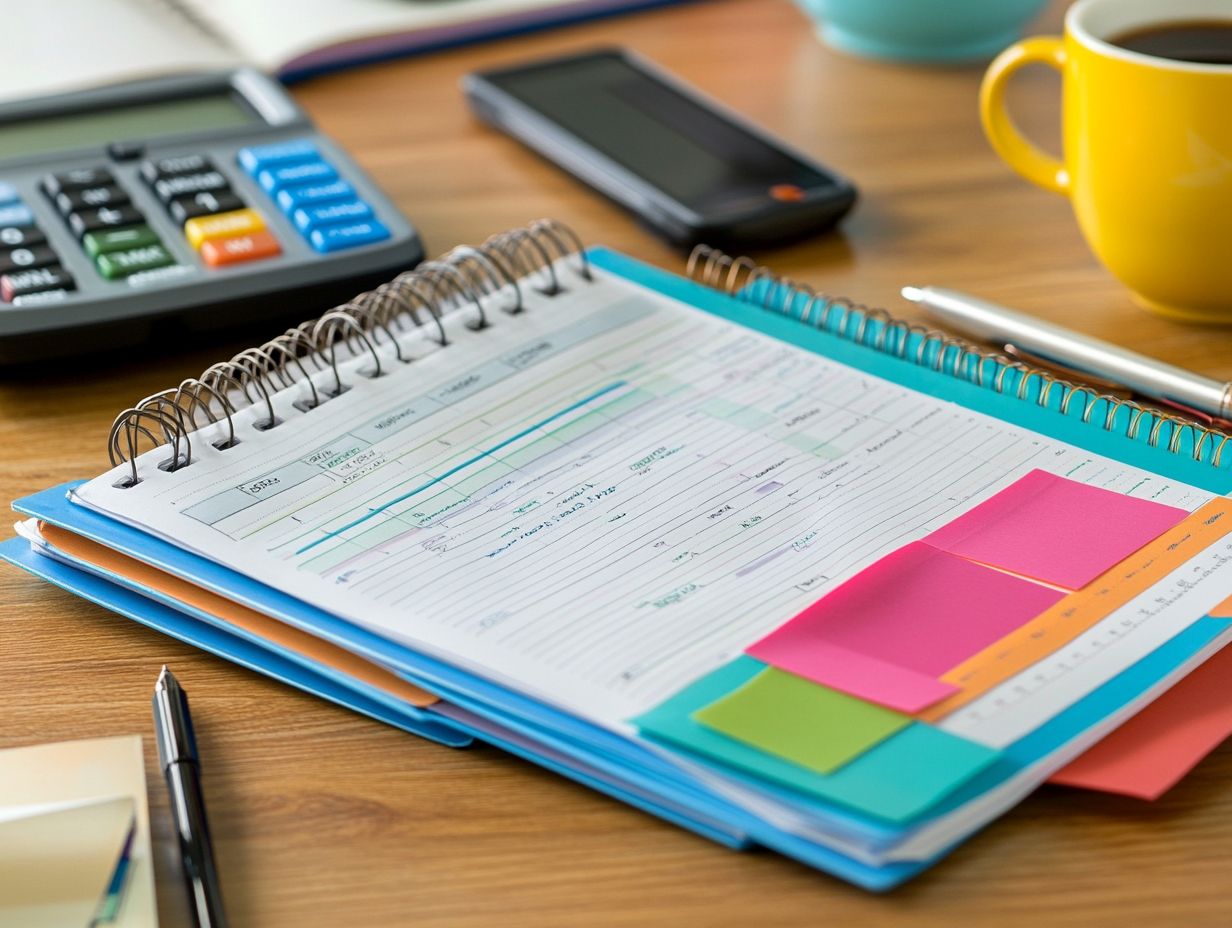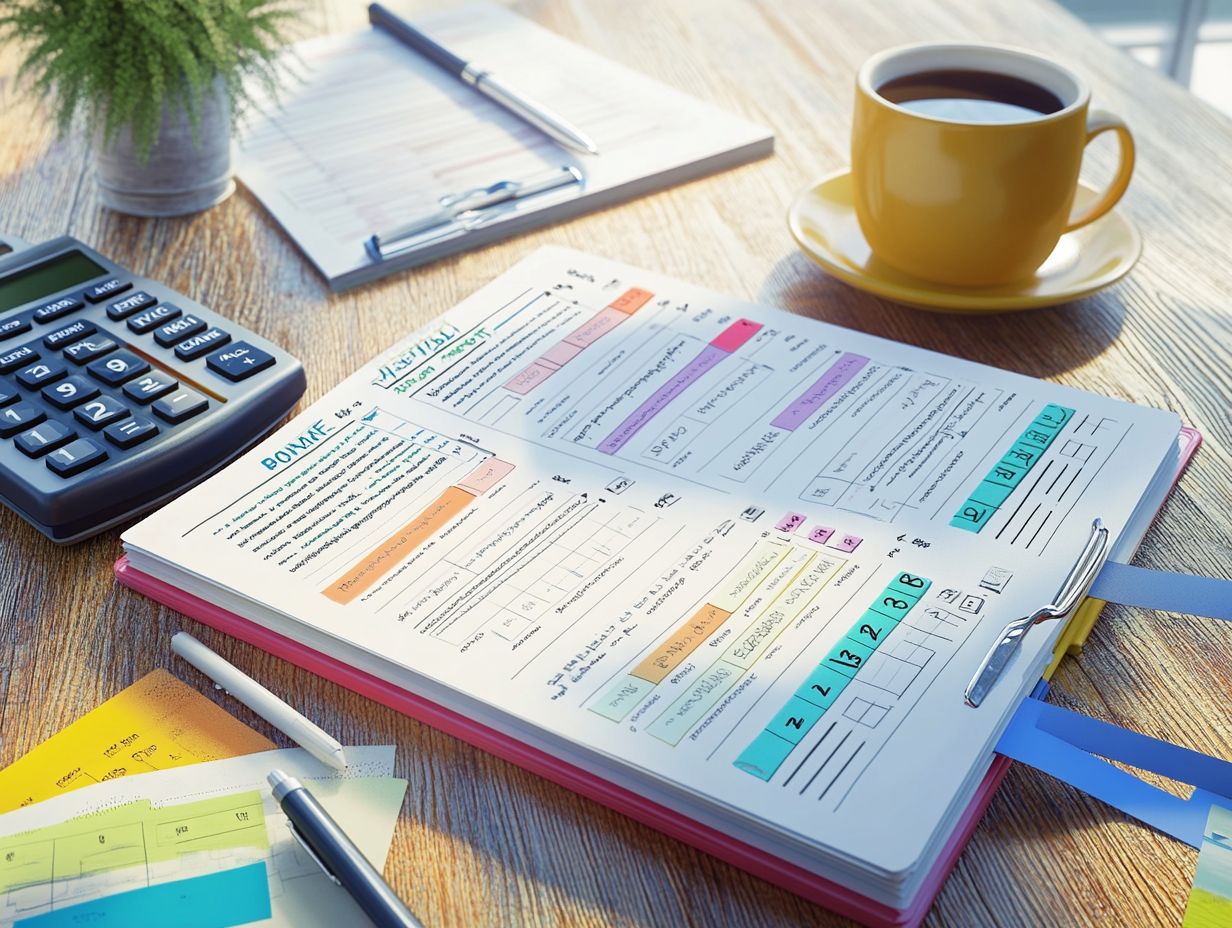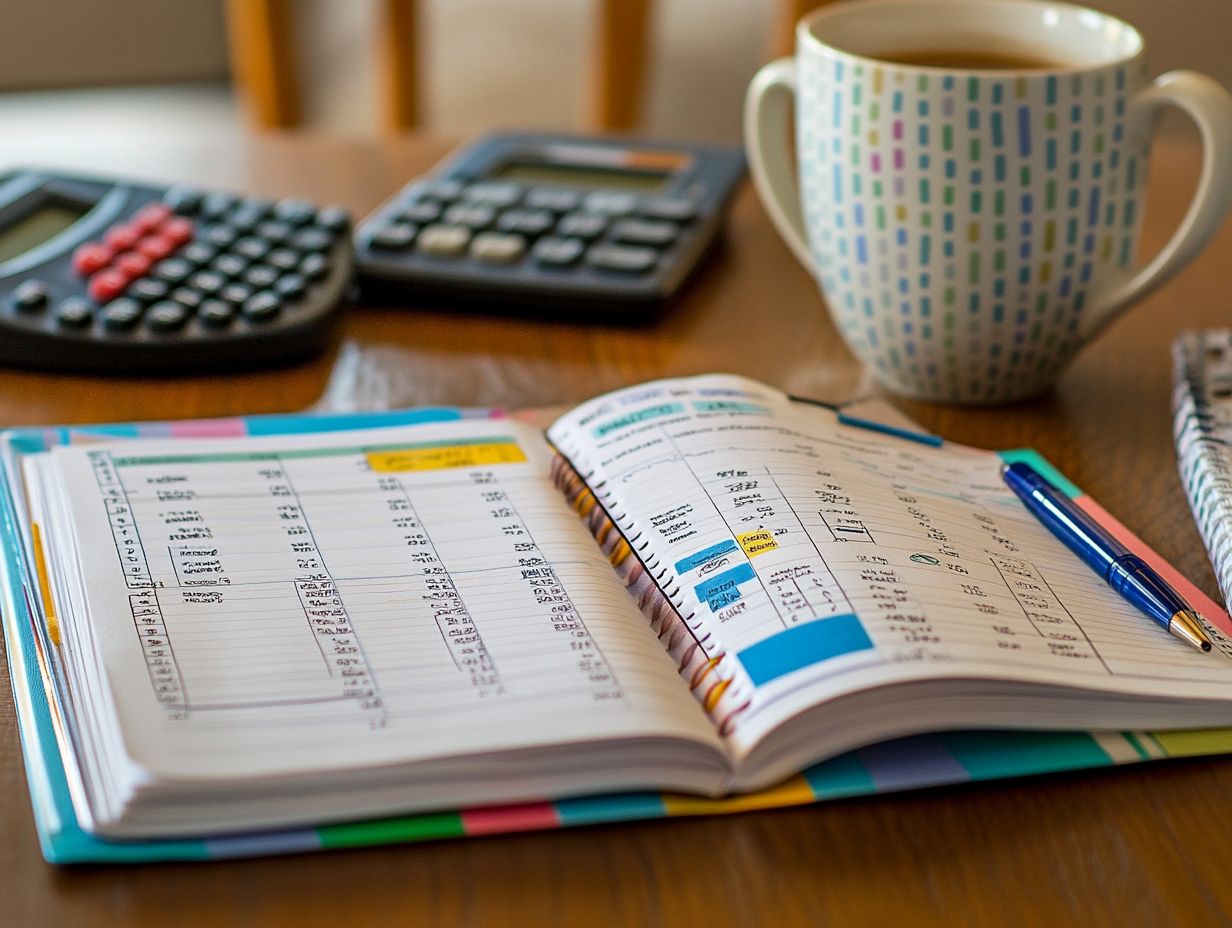What is a Personal Finance Workbook?
Managing personal finances can feel daunting. A personal finance workbook can simplify the process for you.
This article explores personal finance workbooks and how they can change the way you manage your money. You ll see a comparison between printable and digital options.
We will share effective strategies to maximize your workbook’s benefits. If you want a personalized approach, learn how to create your own customizable workbook.
Take charge of your finances today!
Contents
- Key Takeaways:
- Benefits of Using a Personal Finance Workbook
- Types of Personal Finance Workbooks
- How to Choose the Right Personal Finance Workbook
- Using a Personal Finance Workbook Effectively
- Creating Your Own Personal Finance Workbook
- Frequently Asked Questions
- What is a Personal Finance Workbook?
- How can a Personal Finance Workbook help me?
- Do I need any specialized knowledge to use a Personal Finance Workbook?
- Are there different types of Personal Finance Workbooks?
- Can I customize a Personal Finance Workbook to suit my needs?
- Where can I find a Personal Finance Workbook?
Key Takeaways:

- A personal finance workbook helps you organize and track your finances.
- It offers benefits like better organization and effective progress tracking.
- Consider your goals, budget, and preferred format when choosing a workbook.
What is a Personal Finance Workbook?
A personal finance workbook is a key resource that allows you to deepen your understanding of personal finance. This tool helps you take charge of your financial journey through organized budgeting and saving techniques.
Think of it as your guide for tracking income, expenses, and investment choices. Engage with this workbook to develop a holistic approach to financial management.
It emphasizes documenting your financial statements. This sheds light on your spending habits and reveals opportunities for improvement.
With a structured workbook, you can change your money habits. This leads to informed decisions and better financial security.
Benefits of Using a Personal Finance Workbook
Using a personal finance workbook brings many advantages, including heightened financial awareness and refined budgeting skills. This tool allows you to document your expenses and track your overall financial health.
By organizing your data, you can improve your financial management and investment strategies. It also helps you plan for retirement and manage federal income tax more easily.
Organizing Finances and Tracking Progress
Using a personal finance workbook effectively is crucial for tracking your financial goals. Systematically recording your expenses helps you uncover spending patterns and prioritize savings.
This organized method simplifies financial monitoring. It enables you to make informed choices about spending and saving.
Tools like financial statements provide a complete view of your financial status. Regular updates give clearer insights into your income and expenses.
Tracking your progress reveals trends that may need budget adjustments. Techniques like the 50/30/20 rule can guide your budgeting.
This approach enhances accountability and lays a foundation for long-term financial stability and growth.
Types of Personal Finance Workbooks

You ll find a diverse array of personal finance workbooks tailored to meet various preferences and needs. Whether you prefer traditional printable formats or the sleek appeal of editable PDFs, there s something for everyone.
These workbooks offer customization options that allow for a personalized experience. You can select the format that aligns best with your lifestyle and money management practices.
Digital workbooks often come with interactive features, making it easier to track expenses and organize financial data. If you enjoy the tactile experience of pen and paper, printable workbooks are a reliable resource for budgeting and recording expenses.
Printable vs. Digital Workbooks
When choosing between printable and digital workbooks, it s essential to weigh the pros and cons. Printable workbooks provide a hands-on experience, allowing for easy customization with handwritten notes.
In contrast, digital workbooks especially editable PDFs offer unparalleled convenience. They often automate calculations and enable real-time spending tracking.
These differences shape how you manage your money, making it critical to analyze your preferences and financial goals.
Both formats present distinct benefits. For instance, having immediate access to digital workbooks on your mobile device means you ll never miss an important budget update again!
The inclusion of financial calculators in digital workbooks streamlines your calculations, providing insights that can be harder to achieve with paper-based formats.
If you prefer a less distracting environment, printable options might be easier to engage with. Finding a balance based on your habits and comfort with technology is vital.
How to Choose the Right Personal Finance Workbook
Selecting the ideal personal finance workbook requires thoughtful consideration. Reflect on your financial goals, preferred format, and specific features that resonate with you.
Understanding these elements can help you find the workbook that will best aid your journey toward financial independence and effective budgeting.
Consider your comfort level with technology. Are you drawn to the convenience of digital workbooks, or do you prefer the straightforwardness of printable options? This choice can impact your overall experience in managing your spending, saving, and earning.
Factors to Consider
- Your specific financial goals
- Preferred format
- How you plan to track your expenses effectively
Understanding if you need a workbook emphasizing budgeting strategies or one with comprehensive financial statements will significantly influence your decision.
The importance of choosing the right workbook cannot be overstated; it affects your ability to manage personal finances and achieve your objectives.
Having a clear focus on financial goals like debt reduction, saving for retirement, or building an emergency fund can be greatly enhanced by the right tools.
Tracking your expenses is crucial in this journey; it reveals your spending habits and identifies areas for improvement.
By actively considering these factors, you can build a strong foundation for effective financial planning, helping you reach your financial aspirations more efficiently.
Using a Personal Finance Workbook Effectively

To truly maximize the benefits of a Personal Finance Workbook, it’s essential to grasp how to use it effectively through consistent budgeting and money management techniques.
By regularly updating your records, tracking your expenses, and analyzing your financial statements, you can uncover valuable insights into your spending habits, empowering you to make informed decisions.
Set aside dedicated time to review your financial goals. This practice will keep you laser-focused on achieving financial independence and adopting sound investment strategies.
Tips and Strategies
Using smart tips can greatly improve your Personal Finance Workbook experience, leading to better financial management and informed choices. Consistently updating your workbook with income and expenses, setting clear financial goals, and reviewing your net worth statement are essential tactics that provide clarity on your path to financial independence.
Leveraging tools like financial calculators can streamline your budgeting efforts and help you assess investment opportunities with greater accuracy.
A weekly review of your workbook helps catch errors early and keeps your goals clear. By breaking down larger goals into manageable milestones, you cultivate motivation, creating a clear pathway toward savings or debt repayment.
Make the most of online resources and community forums for valuable tips and advice. Connecting with others on similar journeys can offer insights and inspiration. Don t hesitate to adapt and revise your strategies based on changing financial circumstances; flexibility is crucial in personal finance management, ensuring you remain resilient in the face of new challenges.
Creating Your Own Personal Finance Workbook
Creating your own Personal Finance Workbook is exciting! It allows you to tailor it to your exact financial needs.
By integrating sections dedicated to budgeting, expense tracking, and retirement planning, you can create a workbook that aligns seamlessly with your financial aspirations. This customized approach enhances usability and simplifies complex financial concepts, such as how to handle potential financial losses and credit calculations, ultimately paving the way toward your goal of financial independence.
Customizing for Your Needs
It’s important to customize your Personal Finance Workbook to fit your needs. This tailored approach allows you to track expenses, calculate net worth, or plan for retirement all reflecting your individual journey toward financial independence. Customization keeps you focused on your objectives and allows you to adapt as your financial situation evolves.
To achieve this effectively, explore various layout options that suit your personal style. You might prefer digital formats for seamless updates or printed versions for a more hands-on experience.
Important sections to consider including are:
- Monthly budget planners
- Savings trackers
- Debt repayment plans
These elements will help ensure every critical aspect of your financial life is organized. Aligning the workbook’s structure with specific goals, such as saving for a home or building an emergency fund, is fundamental. This personalized approach promotes better financial habits and boosts your motivation, enabling you to take progressive steps toward a secure and fulfilling financial future.
Frequently Asked Questions

What is a Personal Finance Workbook?
A Personal Finance Workbook is a tool used to track and manage your personal finances. It typically includes budgeting templates, expense trackers, and other financial planning resources.
Start your financial journey today by creating a personalized workbook!
How can a Personal Finance Workbook help me?
A Personal Finance Workbook helps you manage your finances effectively. It gives a clear overview of your income, expenses, and savings.
Do I need any specialized knowledge to use a Personal Finance Workbook?
No, anyone can use a Personal Finance Workbook. They are designed to be user-friendly and include helpful instructions.
Are there different types of Personal Finance Workbooks?
Yes, there are many types available, each with unique features. Some focus on budgeting, while others emphasize investing or managing debt, which means keeping track of what you owe.
Can I customize a Personal Finance Workbook to suit my needs?
You can easily customize many Personal Finance Workbooks to match your unique financial journey. You can add or remove categories, adjust budget amounts, and set specific financial goals.
Where can I find a Personal Finance Workbook?
Personal Finance Workbooks are available online, in bookstores, or through financial institutions. You can also create your own using spreadsheet software or even a simple notebook!






